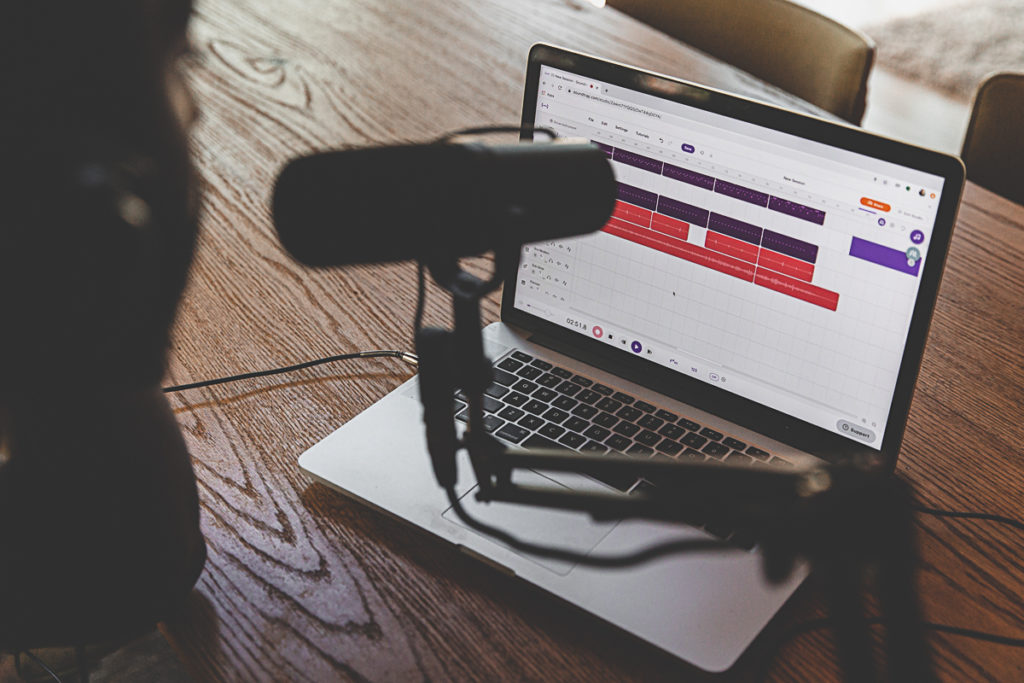Are you thinking about starting your own podcast? Great choice! In doing so, you’ll join a booming community full of growth and opportunity. In Australia alone, the number of podcast listeners has increased from 27 per cent in 2019 to 32 per cent in 2020. Despite the growing prominence of podcasting, you may still have some reservations about launching your own. Maybe English isn’t your first language? Maybe you didn’t study media, so you’re not sure where to start?
I had the exact same hesitations last year. But I’m now hosting a podcast called Inspirations In My Backyard, which showcases human journeys shared through inspirational stories from our local heroes. Speaking from firsthand experience, setting up your own podcast isn’t as hard – or expensive – as you might think. Let’s take a look at everything you need to know about starting a podcast for free as an international student.
How to choose a podcast topic
When it comes to choosing a topic for your podcast, your strategy should come down to one word: passion.
Ask yourself: “Why do I want to do this? Is this something that I’m passionate about? Is this something important that no one is talking about yet?”
Having a strong motivation and purpose is crucial, otherwise you won’t be able to produce your podcast sustainably. All ideas are good: big or small, general or specific.
For example, podcasts like The Weekly Planet and Filmspotting focus on the general topic of popular films. But there are also podcasts that explore niche subjects, such as Grammar Girl’s Quick and Dirty Tips, which identifies best grammar and writing practices. On the other hand, Life in Oz targets the niche of international students in Australia, showcasing what life is like for them as they adapt to their new lives. At the end of the day, as long as you choose a topic that interests you, you’ll make it happen.
Looking for more inspiration? Check out these popular podcasts for international students.
Equipment to start your podcast
Good news: you don’t need to have fancy or expensive equipment to start a podcast. Odds are, you already have most of the equipment you’ll need: a laptop or phone and a pair of headphones with a speaker. For recording, if you use your smartphone, you can use the Recorder app (on Android) or the Voice Memos app (on iPhone). Alternatively, you can use the build-in voice recorder app on your laptop.
You can also see if there’s a studio you can use or equipment you can borrow from your university or college. Visit your education provider’s website to check out the facilities they feature and what kind of equipment is available to rent.
Once you’re feeling confident and ready to take your podcasting to the next level, you can start investing in more sophisticated equipment yourself. For instance, buying a good quality microphone and a pop filter can greatly enhance your sound quality, which will pay off in the long run.
Free podcast software
To make your recording sound more professional, you’ll need a podcast software program to edit your file.
For laptop recordings, there are some excellent free platforms you can use to edit your episodes. Mac users can opt for GarageBand, a fully equipped studio program that features an extensive sound library. A great option for both PC and Mac users is Audacity, a multi-track audio editor and recorder that makes podcast development a breeze. It will take you some time to learn, but there are heaps of tutorials and videos you can find online to ease the process. When it comes to long-distance interviewing, Zoom is recommended for its automatic transcriptions of audio and video recordings.
Once you’ve finished recording and editing, why not kick it up a notch? Post-production webservices, like Auphonic, help improve your sound quality, so your content is as professional as can be.
Where to host your podcast for free
Your hosting platform is where you store your content. It can also automatically distribute your content to popular podcast platforms, such as Spotify, Apple Podcasts and Stitcher. Needless to say, it’s a super important component in creating and growing your podcast.
Many hosting platforms provide free options with conditions. For example, Podbean features an app for Android and iPhone podcast listeners. While it’s very user-friendly, the free plan only has five hours of storage. There’s also Buzzsprout, which features a clear, easy-to-read interface; however, you can only host your podcast for free for up to 90 days. SoundCloud is an excellent option for social interaction, but it’s only free for up to three hours of uploads and doesn’t provide any listener statistics. As of 2021, the only hosting service that is completely free with unlimited storage is Anchor. It’s easy to use, and you can record and edit your audio directly on the platform.
For a comprehensive comparison of 31 podcast hosting tools, click here.
Marketing your podcast
So, you’ve recorded your podcast. Now it’s time to share it with the world! The first step in gaining listeners is to let the public know that your podcast exists. How do you do that? By marketing it. Fortunately, there are several steps you can take to successfully market your podcast and build your audience.
A great place to start is crafting a catchy episode title and captions. Aim to create engaging and easy-to-read teasers that speak to your audience. While you’re at it, try to use some search engine optimisation (SEO) keywords that would rank well in a Google search. Google’s Keyword Planner is an awesome place to start in finding the right keywords for your content.
Believe it or not, word-of-mouth marketing is still super effective in 2021. So, get the message out to your inner circle. Share your podcast on your social media platforms (including LinkedIn if it’s professional or educational), tell your family and friends about it and ask them to spread the word.
You can then expand into your outer circle by sharing your podcast in relevant community groups. For example, you can answer some questions on Quora or Reddit by linking your related episode and grow your listenership that way.
Lastly, don’t forget the importance of engagement and collaboration. You want your podcast to appeal to your listeners, so be sure to ask for their feedback. Ask what the topics they want to hear about, the struggles they face and who they’d like you to interview. The same goes for other podcasters in your niche. Comment on their podcasts to get your name out there, invite them on your show or be a guest on their show. Tapping into other podcasters’ existing audiences can help broaden your own.
Join a radio station as a student
Not quite ready to produce a podcast right now? Feel like you need a little more experience? Consider volunteering at a radio station at your educational institution or in your local community! By doing that, you can develop your public speaking and interviewing skills while meeting like-minded people. The skills you gain and the connections you make will be extremely valuable when you eventually decide to start your own podcast.
Be sure to check out your education provider’s website to see the radio stations they feature and how to become involved.
My podcast journey
For the past two years, I’ve worked with Radio Adelaide, conducting interviews and pursuing my passion for content creation. After interviewing several students, I realised how much I loved hearing people’s stories of finding purpose even in the face of massive challenges.
COVID-19 was a perfect example. A sobering reminder of how fragile life can be, the pandemic left a desperate need for positivity and joy. So, I figured it was the perfect time to follow my purpose and start the podcast I’d been dreaming of launching. Original, relatable and authentic, Inspirations In My Backyard highlights the inspirational stories of local heroes, including international students like yourself.
For more details on my podcasting journey, click here.





